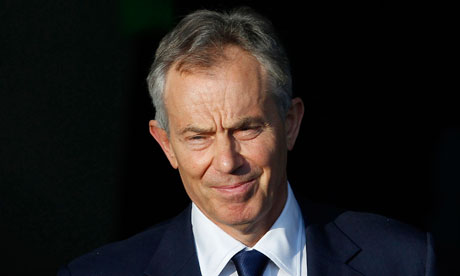Blair's Iraq Timeline Of Lies
Infantile Disorder | 27.01.2011 15:29 | Iraq

Blair leaving the Inquiry and returning to his multimillionaire lifestyle
2001
December: Blair tells Bush that "if [regime change] became the only way of dealing with this issue, we were going to be up for that."
2002
February: Blair assures US President Bush that the UK government shares his commitment to regime change in Iraq.
February: "Formation-level planning" for a British deployment to Iraq begins, under Major General Graeme Lamb.
17th March: Blair tells his chief of staff that "the immediate WMD problems don’t seem obviously worse than three years ago. So we have to re-order our story and message." He complains that having sanctioned military action in Yugoslavia, Afghanistan and Sierra Leone, the Labour Party "should be gung-ho about Saddam."
April: In Texas, Blair tells Bush that "the UK would support military action to bring about regime change, provided that certain conditions were met".
June: US Central Command holds a special Iraq planning conference, including the UK and Australia.
July: Blair tells a House of Commons Select Committee that: "There are no decisions which have been taken about military action."
August: Discussions take place on British troops invading Iraq through the Turkish border in Kurdistan.
September: The now infamous "dodgy dossier" is published, including the '45 minute claim' of Iraq's alleged WMD capacity. Blair tells Parliament that Saddam Hussein has "existing and active military plans for the use of chemical and biological weapons…including against his own Shia population". But "In respect of any military options, we are not at the stage of deciding those options."
October: Attorney General Lord Goldsmith knew that Blair had "indicated to President Bush that he would join the US" without a UN resolution, though Goldsmith "thought that such action by the UK would be unlawful".
November: Resolution 1441 passed by the United Nations Security Council, declaring that "...false statements or omissions in the declarations submitted by Iraq pursuant to this resolution and failure by Iraq at any time to comply with, and cooperate fully in the implementation of, this resolution shall constitute a further material breach of Iraq's obligations." However, it does not sanction an invasion if Iraq breaches these "obligations".
2003
30th January: Attorney General Lord Goldsmith tells Blair that Resolution 1441 did not sanction the use of force and a further resolution would be required.
31st January: At the White House, Bush tells Blair that "Our diplomatic strategy had to be arranged around the military planning…. The start date for the military campaign was now pencilled in for 10 March." Blair tells Bush that he was "solidly with the president and ready to do whatever it took to disarm Saddam."
7th March: Lord Goldsmith apparently changes his mind, and advises Blair that "a reasonable case can be made that resolution 1441 is capable in principle of reviving the authorisation [of the use of force] in Resolution 678 without a further resolution" - essentially declaring invasion legal without a second resolution.
19th March: Having been presented with false 'intelligence', the UK Parliament backs an invasion of Iraq.
20th March: US-led invasion of Iraq begins, with support from the UK and other coalition partners.
There is no way that the United States or the United Kingdom governments will grant a trial of Tony Blair and his key associates. If they have their way, he will continue to rake in millions of pounds as an after dinner speaker to the repulsively rich and powerful, and adviser to those who profited from the Iraq invasion. It is the task of the international working class to ensure that Bush, Blair, and all the such politicians face our own court.
Infantile Disorder
 Homepage:
http://infantile-disorder.blogspot.com/
Homepage:
http://infantile-disorder.blogspot.com/